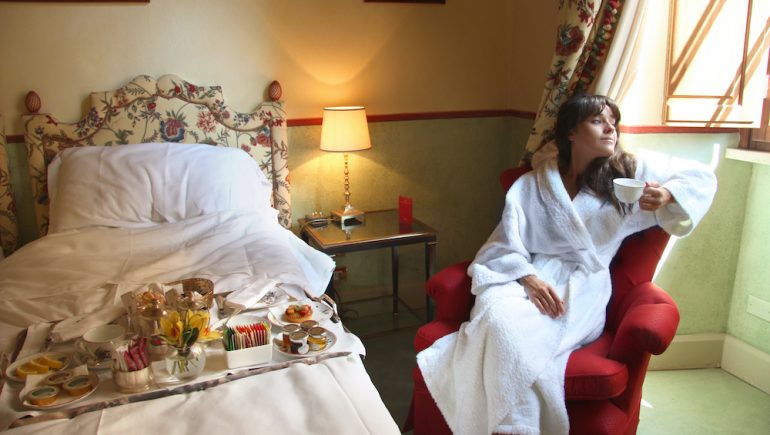You may have stayed at a bed-and-breakfast so charming that you’re thinking you might like to own and run one yourself. Whether you would be converting your own home or buying another, there are important issues to consider before you start buying fresh sheets and towels and perfecting your cinnamon roll recipe. Is your bed-and-breakfast fantasy a realistic idea, or a pipe dream?
What motivates you?
Overnight accommodations in a home-style setting appeal to many people. Bed-and-breakfasts that are historic, quaint and located in neighborhoods filled with similar homes are particularly charming. It’s no wonder lots of folks fantasize about running one of their own.
The reality of bed-and-breakfast ownership, however, is that that charm requires a lot of hard work. B-and-b owners work hard managing bookings, cooking meals and cleaning rooms for the next guests. Owning and running one of these properties is a business, with all that entails.
Will your romantic vision wear out quickly in the face of these realities? Or is the business aspect of owning and running a bed-and-breakfast what appeals to you most? Examining your motivation and how well it holds up to reality is a vital first step if you are considering your own bed-and-breakfast.
Can you comply with the legalities?
Whether you want to use your existing home for a b-and-b or purchase another house to convert, it is essential that you research the legal requirements.
Unfortunately, there’s no single governing authority to consult. Start within the neighborhood. If there is a homeowners association (HOA), it has a say in whether short-term rentals are allowed. Many HOAs do not, and they can legally enforce compliance with their regulations.
City and county governments impose a number of laws and regulations on bed-and-breakfasts. You must comply with local zoning laws, which may not allow a bed-and-breakfast in your chosen neighborhood and will have rules about the number of rooms, parking and signage if they do. You’ll need a business license. If you intend to cook for your guests, you will probably need to be registered with and inspected by the county health department, just as a restaurant would. There will be local and state taxes to collect and pay to taxing authorities.
How strong is the market for your bed-and-breakfast?
A bed-and-breakfast generally is not a destination location. People typically stay at them so that they can visit nearby attractions such as beaches, festivals, amusement parks, college athletic events and more. Your business success depends on being in an area rich with attractions that draw visitors who need a place like yours to stay. Carefully consider whether your area will draw sufficient guests to sustain your bed-and-breakfast business.
What is the competition like?
If the area has attractions that draw visitors, then it probably already has lots of lodging. Try to determine whether the local market can support another bed-and-breakfast.
What will you offer guests at your B-and-B?
While surveying competitors, check to see which amenities they offer, since you’ll need the same to be competitive. Guests definitely want private bathrooms and Wi-Fi and would likely appreciate cable or satellite TV. Safe and convenient parking is also important.
What will you charge?
Go online to thoroughly analyze the rates of competitors, especially those whose bed-and-breakfasts are very similar to what you would offer. To determine whether you could charge those same rates and be profitable, you must account for all the costs of hosting your guests, including supplies, cleaning help, food and more, as well as your initial investment and any remodeling expenses. These costs will determine how much you must charge to be profitable.
Related – How to Use Your Home to Make Money


